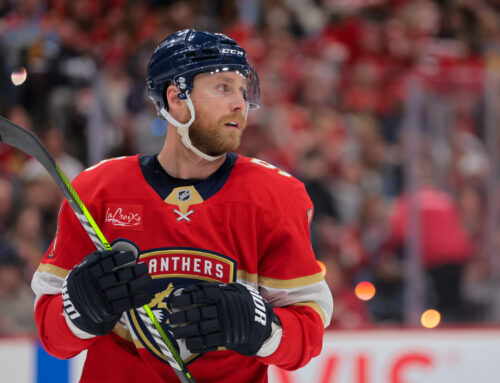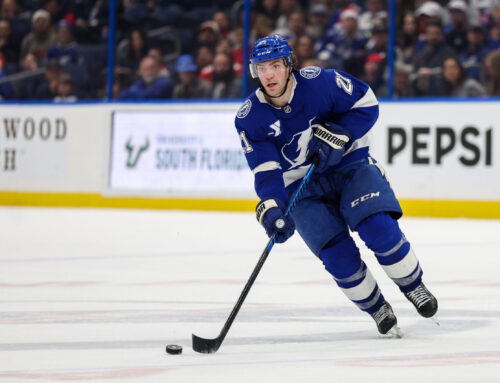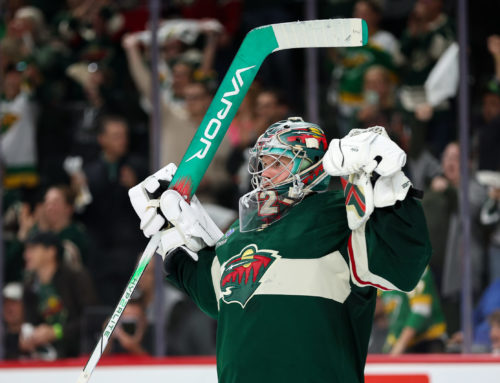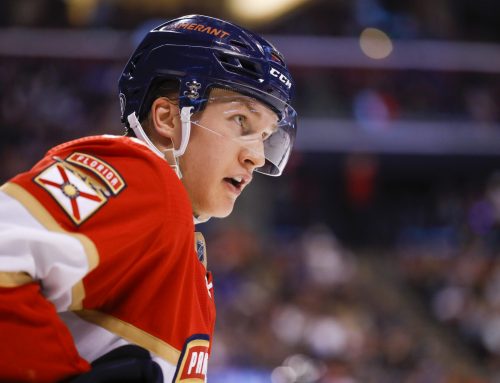
Some suggestions on how to generate interest in joining your start-up fantasy league…
If you're like me, the time you've spent poring over the newly released DobberHockey Fantasy Guide (still the best there is!) has reinvigorated your interest in fantasy hockey for the upcoming season. And now that you're back in the fantasy hockey saddle again, it's time to take on a challenge.
Between now and when the puck drops on October 1, each of you needs to convince at least one person (who isn't already in a league) to do fantasy hockey this season. Yup, that's the challenge. And here's the key – if you do this, not only will it mean more people participating in fantasy hockey, which would be great just on its own, but, as I'll explain in my "Final Verdict", you'll also likely help your own fantasy hockey knowledge and success in the process.
To help you meet this challenge, here's some advice on how to best go about introducing fantasy hockey to different types of people. Of course, feel free to add your own suggestions in the comments.
Who should you approach?
Maybe you don't even realize it, but I guarantee that everyone who's reading this knows literally dozens of people to approach about taking part in fantasy hockey. It could be individuals who you see every day, like your immediate family, close friends, coworkers, or classmates. And thanks to social media, it can also be folks you know but don't interact with on a regular basis.
For all the people you approach and find out are not already doing fantasy hockey, you'll want to divide them into one of two categories – (1) people who consider themselves NHL fans, and (2) people who either don't follow hockey at all or don't follow it enough to maybe even know about fantasy hockey. The good news is there are ways to get both groups on board.
How to handle fans who (for whatever reason) don't do fantasy hockey
As fantasy hockey enthusiasts, we see no excuse for people who already follow the NHL not to be doing fantasy hockey. But as the old saying goes, you catch more flies with honey than vinegar, which in this case means you need to sweet talk them into playing fantasy hockey instead of approaching the situation by making them feel bad or disloyal just because they're not already an active poolie.
Start by trying to find out the reason why they're not currently involved in fantasy hockey. Maybe they were part of a fantasy hockey league in the past, but they lost interest or didn't do well. In either case, the biggest key is to show them all the great options that exist today which weren't around even a few years ago – things like different scoring formats and leagues which measure stats beyond the old basics they probably remember. And let them know about all the great resources out there nowadays, like Frozen Pool, Goalie Post and Fantasy Hockey Geek. Plus, be sure to tell them how easy it is either to start their own league or to get into an existing league that matches with their interest level and desired scoring format. Hopefully these folks won't need much convincing to get back in the game.
For NHL fans who slipped through the cracks and somehow have never been involved in fantasy hockey, you definitely need to find out why that's the case, but again making sure to use an approach which doesn't risk leaving them feeling criticized. Concentrate on telling them how playing fantasy hockey is the natural extension of being a hockey fan. Explain the different ways that fantasy hockey leagues work, and all the fun they can have basically acting like a real life general manager. And if they say they don't have time to spare, make sure they realize that many leagues have weekly line-up setting, which means they don't necessarily have to spend a lot of time focusing on the league each day.
What about people who aren't hockey fans?
The best way to open the conversation with people who aren't hockey fans is to reassure them that they don't need to know the ins and outs of hockey in order to play (and even do well in) fantasy hockey, and that once they're involved they'll enjoy watching and learning even more about the sport. In other words, you need to convince them there isn't any real barrier to entry. Point out to them that millions of today's avid fantasy football players weren't actually big fans when they first started, or even knew much beyond the basics about the game at first. And maybe even mention the NCAA basketball tournament. Sure, it's only a brief tournament as opposed to a full hockey season, but it's something good to mention, since it helps illustrate that for beginners, fantasy sports (like the NCCA tourney) are often more about fun and the social element than they are about being a scholar of the game.
A very good group of people to target are fantasy baseball players who don't follow hockey, since there is almost no overlap between the regular seasons for hockey and baseball. You can tell them they won't have to ignore baseball, and can just slide from fantasy hockey into fantasy baseball in spring, and then vice versa in the fall. Plus, you can explain how the two sports are similar in terms of fantasy players, with goalies being analogous to closers, defensemen to weaker hitting infielders, wingers to outfielders, and centers to corner infielders (I hope these analogies make sense – I'm not a fantasy baseball guy).
In the end the key is to be prepared for people to give you a list of concerns, and to know how to address those concerns to help keep things moving on a path to them saying yes. And you'll definitely learn useful information as you go along, so start by approaching people who you think might be less likely to say yes, since that way you'll be in great shape to later deal with the folks who offer the best prospects of coming on board.
Specific advice for certain people
In addition to the general advice above, there are a few specific things to consider when approaching certain types of people. For close friends or family members, you might want to let them shadow your fantasy league activities, like helping you prepare for your draft. And you can give them updates on league standings and transactions, telling them your ideas and asking them for their input on things like trades. That should help get them hooked, and then from there maybe you point them toward a free league that starts midseason, or perhaps a league that focuses only on playoff stats.
For people you mostly contact via social media, you can try to encourage them to follow (on Twitter or Facebook) a mix of NHL players, fantasy hockey pundits, and other sources of fun and information. This will put them in an environment where they're getting hockey updates all the time from a wide variety of sources, and should help light a fire that ends up with them taking the plunge into fantasy hockey.
Final Verdict – how all this can help your fantasy hockey success?
Often in life you hear one recurring piece of advice – "get back to basics." As it turns out, by doing that here you'll help your own fantasy hockey endeavors. This is because everyone who does fantasy hockey has developed lots of habits and routines over the years, some of which might not be as helpful as we think. By going "back to basics" you can reassess things that you might take for granted. Plus, seeing things from the perspective of someone who's not involved in fantasy hockey could be eye opening.
In a similar vein, when you help these folks learn about tools and sources for information that are out there, you'll need to force yourself go beyond only the things you already know about and rely upon. Think about it this way – a chef probably has favorite dishes he likes to cook the most. But if he was going to teach someone else how to cook, he wouldn't just teach that person to cook those dishes. He'd know that to really do the best job as a teacher, he'd need to teach them about everything.
When you put forth the time and effort to teach people about the range of fantasy hockey tools and sources out there, I'm guessing you might end up realizing there are things that could help you and which, for whatever reason, you don't already use or consult right now. After all, how many of us make sure to really review all the possible tools for fantasy hockey before every season? Most of us probably rely upon the same things we did the previous season and leave it at that. But in helping someone learn about and investigate the full array of tools and resources that exist, you'll no doubt find a few that you decide to start using (or at least consider using) yourself. And even if you don't, then at least you'll feel more confident that your existing sources are indeed the best out there after having compared them to others. All this will help you a lot in the long and short term.
Hopefully you agree that in taking this challenge the result will be a true win-win situation – finding more fantasy hockey players (certainly a win) while at the same time engaging with people you know to gain a common interest (definitely another win) and also getting some benefit for your own fantasy hockey knowledge in the process (a trifecta of win!). Best of luck with the challenge, and your fantasy hockey season!
Recently, from Holding Court:
| NHL Veterans: Six Players on the Way Down | ||
| NHL Veterans – 6 Guys Defying Father Time | ||
| 7 Guys on New Teams to Stay Away From |





 EDM
EDM PIT
PIT TOR
TOR VAN
VAN FLA
FLA MIN
MIN DET
DET COL
COL BUF
BUF
